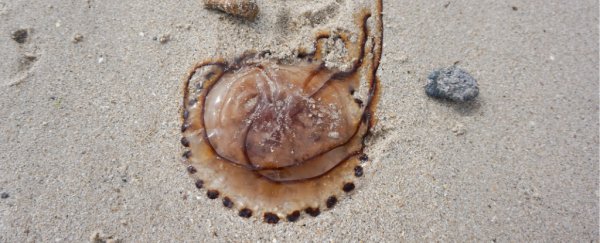According to the IUCN Red List 32,000 species are threatened with extinction – everything from birds and mammals, to reef corals and crustaceans. And that's only the species we know about.
But although we might be working hard to help some species come back from the brink, we might also be eating some threatened species without even realising it.
Searching industrial fishing records, researchers identified almost 100 endangered species being sold as seafood, and this is done legally.
"Species that aren't cute like whales or sea turtles often don't end up getting the protection they deserve," University of Queensland (UQ) biologist and first author of the new paper, Leslie Roberson told ScienceAlert.
"Despite national and international commitments to protect threatened species, we actively fish for many of these threatened species."
For those of us who enjoy the odd fish and chips this isn't great news, but the researchers have come up with an unconventional way we can help while still enjoying seafood – and it involves eating jellyfish.
Between 2006 and 2014, the team found records of 92 vulnerable or endangered (11 of them critically endangered) species of seafood being caught, recorded, and sold – 13 of them internationally.
When sold, these fish and invertebrate species are not required to be labelled according to species, so consumers have no way of knowing what they're eating.
The team stresses that this is only a snapshot of the real problem, as they only looked at a specific section of records and excluded groups of fish such as sharks or rays, which are commonly eaten in Australia, Europe, and some Asian countries.
"We looked just at the reported catch and imports, not even digging into illegal and unreported fishing, and found 92 species that are caught or traded despite being listed as globally threatened with extinction," UQ conservation scientist Carissa Klein told ScienceAlert.
"A lot of the seafood catch and import records are listed in groups like 'marine fish'. Here we didn't look at those vague records, we only looked at records where the actual species was listed - so we've made a huge underestimate of the actual catch of endangered species."
The seafood industry is a tangled mess of supply chains criss-crossing countries, and very few of us can avoid the blame.
"European countries (e.g. Germany, UK, Spain) and the USA comprise most of the top importers of threatened species by volume and value," the team wrote in their paper.
But there are some ways to untangle the mess we're creating in the world's oceans. Including expanding our idea of seafood to include jellyfish.
That might sound a little left of field, but it's not the first time scientists have suggested it as a food source. And with jellyfish being one of a minority of wild animals that scientists think might be actually increasing in numbers around the world, it makes a lot of sense.
Back in 2017, researchers in Denmark made crispy chips out of jellyfish, while people in China have been enjoying jellyfish for over 1,700 years. Depending on the species, it could help us manage jellyfish blooms, and keep other endangered species in the sea.
"It's really just a mild chewy thing without much taste. It's actually quite good with a yummy sauce!" Roberson told ScienceAlert.
"A lot of our tastes for seafood are driven largely by culture and tradition. The obvious example is shark fin soup - shark fins are basically tasteless, and it's all about the seasoning and the sauce (and the status) that makes it a delicacy in China."
Of course, there are other ways to help keep endangered species off the menu.
"We need to improve the labelling of seafood so that we are more aware of what we are eating. And if the seafood is not labelled, the consumer should ask what species it is, where it was caught, and how it was caught… so they have all of the information to make an informed choice," said Klein.
And the informed choice, at least in some places, is easier than you might imagine. In Australia, where the researchers are based, there's the Sustainable Seafood Guide, which is able to provide the best choices for seafood. There's also Seafood Watch in the US, which is run by the Monterey Bay Aquarium.
And the obvious - "it should be illegal to eat something that is threatened by extinction, especially species that are critically endangered," Klein said.
"If we can better coordinate fisheries and conservation policies, we can prevent it from happening."
"We would never consider eating mountain gorillas or elephants, both of which are endangered," Robertson added.
The research has been published in Nature Communications.
